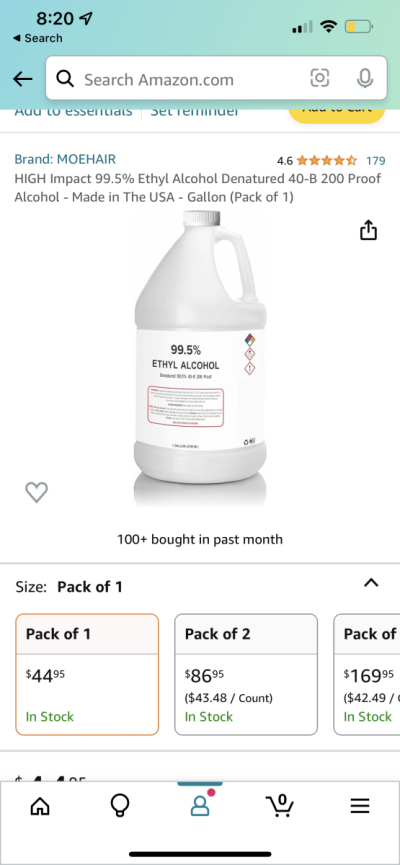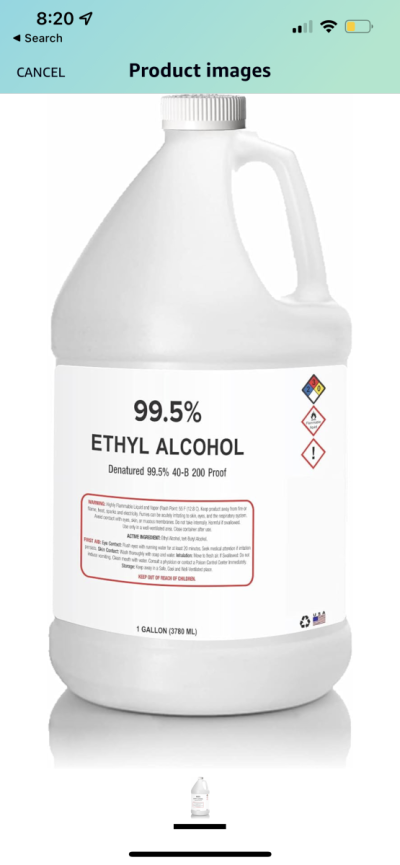Hello, I have been using 2ml daily of %95.5 ethanol in a 450 gallon set up. When introducing this dosage into the return pump in the sump, within ten minutes my elegance coral shriveled up and took a week to return to normalcy my fox coral also was possibly disturbed from this too as he receded when dosing as well. Is this a common problem? Water parameters are stable and haven't been an issue.
Navigation
Install the app
How to install the app on iOS
Follow along with the video below to see how to install our site as a web app on your home screen.
Note: This feature may not be available in some browsers.
More options
You are using an out of date browser. It may not display this or other websites correctly.
You should upgrade or use an alternative browser.
You should upgrade or use an alternative browser.
Ethanol/ Vodka Dosing Potentially Harming LPS Coral
- Thread starter brayden2980
- Start date
- Tagged users None
Randy Holmes-Farley
Reef Chemist
View Badges
Staff member
Super Moderator
Excellence Award
Expert Contributor
Article Contributor
R2R Research
My Tank Thread
- Joined
- Sep 5, 2014
- Messages
- 67,438
- Reaction score
- 63,838
Corrections: It is %99.5 and although they are the same, I will specify that the bottle says "Ethyl Alcohol"
Can you show the label? Was it denatured?
A small amount of ethanol should not have a rapid problematic effect like that.
Randy Holmes-Farley
Reef Chemist
View Badges
Staff member
Super Moderator
Excellence Award
Expert Contributor
Article Contributor
R2R Research
My Tank Thread
- Joined
- Sep 5, 2014
- Messages
- 67,438
- Reaction score
- 63,838
If I am reading the fine print correctly, it is denatured with t-butyl alcohol. I would not expect the small amount present to be any issue, but I do not recall seeing anyone dose t-butyl alcohol, so I'm not sure what effect it might have.
I
I was curious about the t-butyl as well. It’s a very small amount in this product but when I researched it it didn’t seem to be harmful in any way and is present in water sometimes as wellIf I am reading the fine print correctly, it is denatured with t-butyl alcohol. I would not expect the small amount present to be any issue, but I do not recall seeing anyone dose t-butyl alcohol, so I'm not sure what effect it might have.
Someone in my accidental duplicate post asked the purpose for carbon dosing.
I’m trying to increase bacteria colony size for coral growth along with maintaining nutrients to not rely on physical filtration methods. I currently only run a refugium, carbon dosing, and skimming.
I’m trying to increase bacteria colony size for coral growth along with maintaining nutrients to not rely on physical filtration methods. I currently only run a refugium, carbon dosing, and skimming.
Randy Holmes-Farley
Reef Chemist
View Badges
Staff member
Super Moderator
Excellence Award
Expert Contributor
Article Contributor
R2R Research
My Tank Thread
- Joined
- Sep 5, 2014
- Messages
- 67,438
- Reaction score
- 63,838
If it were my system, I'd assume it was coincidence, or at the least, something that is not going to be a big problem if restarted slowly, and restart dosing at a much lower dose and ramp up if all goes well.
I would switch to vinegar. Corals and many reef organisms can directly consume acetate. It is a highly processed organic in the oceans, so dosing it would be very natural.Someone in my accidental duplicate post asked the purpose for carbon dosing.
I’m trying to increase bacteria colony size for coral growth along with maintaining nutrients to not rely on physical filtration methods. I currently only run a refugium, carbon dosing, and skimming.
Vinegar can grow bacteria, possibly more varieties. It’s great for filter feeders etc.
FWIW, the degradation of organics is a big process in the ocean, and is entirely natural. Acetate (the organic in vinegar) is thought to be the largest turnover organic in the ocean, and may be the most common organic in sediment pore water.
Acetate has many uses in organisms.
It can be oxidized with O2 to give energy plus CO2 and bicarbonate.
it can also be used as a building block to make larger biomolecules. Fatty acids are made from acetate as a building block, for example.
That’s what I thought. Especially when I stopped for the week and started again at half dose and the problem wasn’t as big. My phosphates were slightly elevated last time as well and might’ve just made them more sensitive to thisIf it were my system, I'd assume it was coincidence, or at the least, something that is not going to be a big problem if restarted slowly, and restart dosing at a much lower dose and ramp up if all goes well.
I was warry of using vinegar because of its affect on ph as I just made lots of efforts to raise it. I will consider trying that or making a mix of the two to see if that works better and the corals like itI would switch to vinegar. Corals and many reef organisms can directly consume acetate. It is a highly processed organic in the oceans, so dosing it would be very natural.
Vinegar can grow bacteria, possibly more varieties. It’s great for filter feeders etc.
Vinegar and vodka have the same exact pH lowering effect. Vodka is 8 times stronger than vokdaI was warry of using vinegar because of its affect on ph as I just made lots of efforts to raise it. I will consider trying that or making a mix of the two to see if that works better and the corals like it
So 1mL of vodka has an equal pH decrease as 8mL of vinegar.
I
Interesting. I didn’t know that. I’ll experiment over the next few months which my tank responds better to and make a separate thread with the resultsVinegar and vodka have the same exact pH lowering effect. Vodka is 8 times stronger than vokda
So 1mL of vodka has an equal pH decrease as 8mL of vinegar.
Randy Holmes-Farley
Reef Chemist
View Badges
Staff member
Super Moderator
Excellence Award
Expert Contributor
Article Contributor
R2R Research
My Tank Thread
- Joined
- Sep 5, 2014
- Messages
- 67,438
- Reaction score
- 63,838
I
Interesting. I didn’t know that. I’ll experiment over the next few months which my tank responds better to and make a separate thread with the results
We cover it here:

Nitrates 100+ppm, Need help with Dosing Vodka
Instant Ocean, not Reef Crystals. They did give you a free box of RC. You can buy a 5 year supply of baking soda and driveway melt for $20 if you want to make your IO look like RC. Earlier in the week, the RC was 60-62, IIRC, so it has gone back up.
 www.reef2reef.com
www.reef2reef.com
from it:
The overall pH drop in a closed system should be the same for vinegar and vodka metabolism since the same amount of CO2 is formed from each singe molecule, but vinegar has it drop immediately (from dissociation of the acetic acid) and less later (from production of CO2), while vodka has it all spread out later (making many folks not even notice it).
CH3CH2OH (vodka) + 3O2 --> 2CO2 + 3H2O
CH3CO2H (vinegar) + 2O2 --> 2CO2 + 2H2O
If we rewrite the vinegar equation in steps, we see that while the H+ release instantly drops pH, the subsequent conversion of the acetate to CO2 only produces half the amount of CO2:
CH3CO2H --> H+ + CH3CO2- (that lowers pH instantly by one H+ per acetic acid))
then we oxidize the acetate:
CH3CO2- + 2O2 --> 1CO2 + 1 HCO3- + 1 H2O
That oxidation has only one CO2 added, instead of 2. The HCO3- does not have much effect on pH since it mostly stays as bicarbonate.
Thus, half of the vinegar pH drop is shown instantly, and about half is shown later when CO2 is made, while vodka does it all later.
Similar threads
- Replies
- 3
- Views
- 174
- Replies
- 5
- Views
- 328
- Replies
- 29
- Views
- 819
- Replies
- 184
- Views
- 11,182
- Replies
- 11
- Views
- 259
New Posts
-
-
-
-
New line of UV sterilizers from Lifeguard
- Latest: Semper.Reefing

















